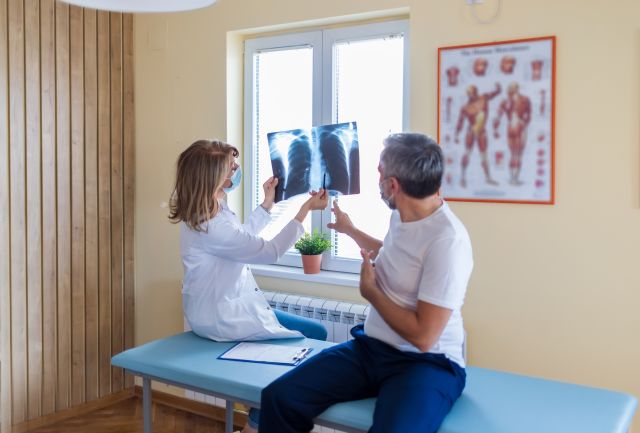Updated on October 7, 2024
Chronic obstructive pulmonary disease (COPD) and lung cancer are serious conditions that lead to hundreds of thousands deaths annually in the United States. Smoking is a significant risk factor for both, but the connection between the two diseases goes beyond tobacco use. People with COPD have much higher odds of developing lung cancer and many lung cancer patients have coexisting COPD.
What is COPD exactly and how is it linked to lung cancer? What can your healthcare provider (HCP) do to ensure your best possible outcome if you have both conditions?
COPD basics
COPD is a chronic, progressive disease characterized by a decline in lung function that makes it difficult to breathe. There are two main types. The first, emphysema, occurs when your lungs’ air sacs are damaged. The second, chronic bronchitis, is inflammation of a lung or lungs that causes excess mucus production, wheezing, and difficulty breathing, among other symptoms. Most people with COPD have symptoms of both conditions.
Smoking is the top risk factor for developing COPD. About 90 percent of COPD patients have smoked before, according to the American Lung Association. It’s believed that COPD is underdiagnosed and often misdiagnosed. Many people with the disease don’t know they have it.
Facts about lung cancer
Lung cancer occurs when abnormal cells in your lungs grow out of control. There are two primary types of the disease. Non-small cell lung cancer (NSCLC) accounts for 80 to 85 percent of cases, while small cell lung cancer (SCLC) makes up 10 to 15 percent, according to the American Cancer Society
As with COPD, the biggest risk factor for lung cancer is smoking. Compared to non-smokers, those who light up are 15 to 30 times more likely to develop or die of lung cancer.
How COPD and lung cancer overlap
An estimated 5 percent of COPD patients are diagnosed with lung cancer, according to a 2022 review of research published in Frontiers in Oncology. Having COPD increases your chances of developing lung cancer significantly. The more severe the COPD, the higher the risk. What’s more, a considerable proportion of those with lung cancer also have COPD, though they may not be aware.
Although smoking is related to both diseases, COPD is an independent risk factor for lung cancer; having it increases your cancer chances, whether or not you smoke. This may be for a number of reasons, including:
• The inflammation characteristic to COPD could be linked to lung cancer development.
• COPD damages certain parts of the lungs that may make your airways more vulnerable to carcinogens.
• A genetic predisposition toward both diseases could also be a factor.
People with lung cancer and COPD will likely have a worse prognosis than patients without COPD, according to a 2021 study in the journal Nature. This is partly due to quality-of-life issues and reduced pulmonary function. COPD can also interfere with cancer treatment, including chemotherapy, radiation, or surgery. As a result, some research has found that COPD patients have a lower survival rate for lung cancer.
Tips for lung health
If you have COPD, speak with your HCP about the increased risk of lung cancer. They can help you learn about early symptoms—some of which may overlap with those of COPD—like shortness of breath and chronic coughing. They can also discuss the possible value of having lung cancer screenings, especially if you’re a long-time or heavier smoker or if you already have symptoms.
The United States Preventive Services Task Force recommends people between ages 50 and 80 years old be screened each year if they meet the following criteria:
- They currently smoke or have quit within the last 15 years AND
- They have a smoking history of at least 20 pack-years
A pack-year means someone has smoked, on average, at least one pack of cigarettes a day for one year. So, if someone smokes one pack per day for 20 years, it’s considered to be 20 pack-years. If someone smokes two packs a day for 10 years, it’s also considered to be 20 pack-years.
For those with COPD and lung cancer, your health care team should work to manage both diseases. You will likely need to see two types of specialists for your condition management and treatment: a pulmonologist for COPD and an oncologist for lung cancer. Your providers can also help you quit smoking. Quitting is one of the best things you can do for either condition—at any point—as well as for your overall health.






